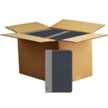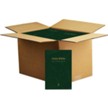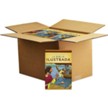2 Chronicles 32-34
Easy-to-Read Version
The King of Assyria Attacks Judah
32 After Hezekiah had faithfully done everything the Lord commanded, King Sennacherib of Assyria came to attack the country of Judah. Sennacherib and his army camped outside the fortresses. He did this so that he could make plans to defeat these towns. Sennacherib wanted to win them for himself. 2 Hezekiah knew that Sennacherib came to Jerusalem to attack it. 3 Then Hezekiah talked to his officials and army officers. They all agreed to stop the waters of the water springs outside the city. The officials and army officers helped Hezekiah. 4 Many people came together and stopped all the springs and the stream that flowed through the middle of the country. They said, “The king of Assyria will not find much water when he comes here!” 5 Hezekiah made Jerusalem stronger. This is how he did it: He rebuilt all the parts of the wall that were broken down. He also built towers on the wall. He also built another wall outside the first wall. He rebuilt the strong places on the east side of the old part of Jerusalem. He made many weapons and shields. 6-7 Hezekiah chose officers of war to be in charge of the people. He met with these officers at the open place near the city gate. He talked to the officers and encouraged them. He said, “Be strong and brave. Don’t be afraid or worry about the king of Assyria or the large army with him. There is a greater power with us than the king of Assyria has with him! 8 The king of Assyria only has men. But we have the Lord our God with us! Our God will help us. He will fight our battles!” So King Hezekiah of Judah encouraged the people and made them feel stronger.
9 King Sennacherib of Assyria and all his army were camped near the town of Lachish so that they could defeat it. Then Sennacherib sent his officers to King Hezekiah of Judah and to all the people of Judah in Jerusalem. His officers had a message for Hezekiah and all the people in Jerusalem.
10 They said, “King Sennacherib of Assyria says this: ‘What do you trust in that makes you stay under attack in Jerusalem? 11 Hezekiah is fooling you. You are being tricked into staying in Jerusalem so that you will die from hunger and thirst. Hezekiah says to you, “The Lord our God will save us from the king of Assyria.” 12 But Hezekiah himself took away the high places and altars that belonged to that god. He told you people of Judah and Jerusalem that you must worship and burn incense on only one altar. 13 Of course, you know what my ancestors and I have done to all the peoples in other countries. The gods of the other countries could not save their people. Those gods could not stop me from destroying their people. 14 My ancestors destroyed those countries. There is no god that can stop me from destroying his people. So you think your god can save you from me? 15 Don’t let Hezekiah fool you or trick you. Don’t believe him because no god of any nation or kingdom has ever been able to keep his people safe from me or my ancestors. Don’t think your god can stop me from destroying you.’”
16 The officers of the king of Assyria said worse things against the Lord God and against Hezekiah, God’s servant. 17 The king of Assyria also wrote letters that insulted the Lord, the God of Israel. This is what the king of Assyria said in those letters: “The gods of the other nations could not stop me from destroying their people. In the same way Hezekiah’s god will not be able to stop me from destroying his people.” 18 Then the Assyrian officers shouted loudly to the people of Jerusalem who were on the city wall. They spoke in the language of Judah so that the people on the wall could understand and be frightened enough that the Assyrians could capture the city of Jerusalem. 19 Then they insulted the God of Jerusalem just as they had insulted all the gods of the people from other nations—even though those gods are only things people made with their hands.
20 Hezekiah the king and the prophet Isaiah son of Amoz prayed about this problem. They prayed very loudly to heaven. 21 Then the Lord sent an angel to the king of Assyria’s camp. That angel killed all the soldiers, leaders, and officers in the Assyrian army. So the king of Assyria went back home to his own country, and his people were ashamed of him. He went into the temple of his god and some of his own sons killed him there with a sword. 22 So the Lord saved Hezekiah and the people in Jerusalem from King Sennacherib of Assyria and from all other people. He cared for Hezekiah and the people of Jerusalem. 23 Many people brought gifts for the Lord to Jerusalem. They brought valuable things to King Hezekiah of Judah. From that time on, all the nations respected Hezekiah.
24 It was in those days that Hezekiah became very sick and near death. He prayed to the Lord, and he spoke to Hezekiah and gave him a sign.[a] 25 But Hezekiah’s heart was proud, so he did not give God thanks for his kindness. This is why God was angry with Hezekiah and with the people of Judah and Jerusalem. 26 But Hezekiah and the people living in Jerusalem changed their hearts and lives. They became humble and stopped being proud. So the Lord’s anger didn’t come on them while Hezekiah was alive.
27 Hezekiah had many riches and much honor. He made places to keep silver, gold, valuable jewels, spices, shields, and all kinds of things. 28 Hezekiah had storage buildings for the grain, new wine, and oil that people sent to him. He had stalls for all the cattle and stalls for the sheep. 29 Hezekiah also built many towns, and he got many flocks of sheep and cattle. God gave him much wealth. 30 It was Hezekiah who stopped up the upper source of the waters of the Gihon Spring in Jerusalem and made the waters flow straight down on the west side of the City of David. And he was successful in everything he did.
31 One time the leaders of Babylon sent messengers to Hezekiah. The messengers asked about a strange sign that had happened in the nations.[b] When they came, God left Hezekiah alone to test him and to know everything that was in Hezekiah’s heart.[c]
32 Everything else Hezekiah did as king and the ways he served God faithfully are written in the book, The Vision of the Prophet Isaiah Son of Amoz and in the book, The History of the Kings of Judah and Israel. 33 Hezekiah died and was buried with his ancestors. The people buried him on the hill where the graves of David’s ancestors are. All the people of Judah and those living in Jerusalem gave honor to Hezekiah when he died. Hezekiah’s son Manasseh became the new king in his place.
Manasseh, King of Judah
33 Manasseh was twelve years old when he became king of Judah. He was king for 55 years in Jerusalem. 2 Manasseh did what the Lord said was wrong. He followed the terrible and sinful ways of the nations that the Lord had forced out of the land before the Israelites. 3 Manasseh rebuilt the high places that his father Hezekiah had broken down. Manasseh built altars for the Baal gods and made Asherah poles. He bowed down to the constellations[d] and worshiped those groups of stars. 4 Manasseh built altars for false gods in the Lord’s Temple. The Lord said about the Temple, “My name will be in Jerusalem forever.” 5 He built altars for all the groups of stars in the two yards of the Lord’s Temple. 6 He also burned his own children for a sacrifice in the Valley of Ben Hinnom.[e] He also used magic by doing soothsaying, divination, and sorcery.[f] He talked with mediums and wizards. He did many things that the Lord said were evil and made him angry. 7 Manasseh also made a statue of an idol and put it in God’s Temple—the very same Temple that God had talked about to David and his son Solomon. God had said, “I will put my name in this house and in Jerusalem—the city that I chose from all the cities in all the tribes—and my name will be there forever! 8 I will not continue to keep the Israelites off the land that I chose to give to their ancestors. But they must obey everything I commanded them. The Israelites must obey all the laws, rules, and commands that I gave Moses to give to them.”
9 Manasseh encouraged the people of Judah and the people living in Jerusalem to do wrong. They were worse than the nations that were in the land before the Israelites—and the Lord destroyed those people.
10 The Lord spoke to Manasseh and to his people, but they refused to listen. 11 So the Lord brought commanders from the king of Assyria’s army to attack Judah. These commanders captured Manasseh and made him their prisoner. They put hooks in him and brass chains on his hands and took him to the country of Babylon.
12 When these troubles came to him, Manasseh begged for help from the Lord his God. He humbled himself before the God of his ancestors. 13 Manasseh prayed to God and begged him for help. God heard his begging and felt sorry for him, so he let Manasseh return to Jerusalem and to his throne. Then Manasseh knew that the Lord was the true God.
14 After that happened, Manasseh built an outer wall for the City of David. This wall went to the west of Gihon Spring in Kidron Valley, to the entrance of the Fish Gate, and around the hill of Ophel.[g] He made the wall very tall. Then he put officers in all the fortresses in Judah. 15 Manasseh took away the strange idol gods, and he took the idol out of the Lord’s Temple. He took away all the altars he had built on the Temple hill, and in Jerusalem. Manasseh threw all the altars out of the city of Jerusalem. 16 Then he set up the Lord’s altar and offered fellowship offerings and thank offerings on it. He gave a command for all the people of Judah to serve the Lord, the God of Israel. 17 The people continued to offer sacrifices at the high places, but their sacrifices were only to the Lord their God.
18 Everything else Manasseh did, his prayer to his God and the words of the seers who spoke to him in the name of the Lord, the God of Israel, are all written in the book, The Official Records of the Kings of Israel. 19 Manasseh’s prayer and how God listened and felt sorry for him are written in The Book of the Seers. Also all his sins, the wrongs he did before he humbled himself, and the places where he built high places and set up the Asherah poles are written in The Book of the Seers. 20 So Manasseh died and was buried with his ancestors. The people buried Manasseh in his own palace. Manasseh’s son Amon became the new king in his place.
Amon, King of Judah
21 Amon was 22 years old when he became king of Judah. He was king for two years in Jerusalem. 22 Amon did evil before the Lord, just as his father Manasseh had done. Amon offered sacrifices for all the carved idols and statues that Manasseh his father made. Amon worshiped those idols. 23 Amon did not humble himself in front of the Lord like Manasseh his father humbled himself. But Amon sinned more and more. 24 His servants made plans against him. They killed Amon in his own house. 25 But the people of Judah killed all the servants who planned against King Amon. Then the people chose Amon’s son Josiah to be the new king.
Josiah, King of Judah
34 Josiah was eight years old when he became king. He was king for 31 years in Jerusalem. 2 He lived in a way that pleased the Lord, always doing what was right, as his ancestor David had done. Josiah never changed this way of life. 3 When Josiah was in his eighth year as king, he began to follow the God worshiped by David his ancestor. He was still young when he began to obey God. When he was in his twelfth year as king he began to destroy the high places, the Asherah poles, and idols that were carved and idols that were made from molds from Judah and Jerusalem. 4 As Josiah watched, the people broke down the altars for the Baal gods. Then he cut down the incense altars that stood high above the people. He broke the idols that were carved and the idols that were made from molds. He beat the idols into powder and sprinkled the powder on the graves of the people who had offered sacrifices to the Baal gods. 5 Josiah even burned the bones of the priests who had served the Baal gods on their own altars. This is how he destroyed idols and idol worship from Judah and Jerusalem. 6 Josiah did the same for the towns in the areas of Manasseh, Ephraim, Simeon, and all the way to Naphtali. He did the same for the ruins near all these towns.[h] 7 Josiah broke down the altars and the Asherah poles. He beat the idols into powder. He cut down all the incense altars used for Baal worship in all the country of Israel. Then he went back to Jerusalem.
8 When Josiah was in his 18th year as king of Judah, he sent Shaphan, Maaseiah, and Joah to rebuild and repair the Temple of the Lord his God. Shaphan was the son of Azaliah. Maaseiah was the city leader. Joah, who was the son of Joahaz, wrote about what happened.
So Josiah commanded the Temple to be repaired so that he could make Judah and the Temple clean. 9 These men came to Hilkiah the high priest. They gave him the money that people gave for God’s Temple. The Levite doorkeepers had collected this money from the people of Manasseh, Ephraim, and from all the Israelites who were left. They also collected this money from all Judah, Benjamin, and all the people living in Jerusalem. 10 Then the Levites paid the men who supervised the work on the Lord’s Temple. And the supervisors paid the workers who repaired the Lord’s Temple. 11 They gave the money to carpenters and builders to buy large rocks that were already cut, and to buy wood. The wood was used to rebuild the buildings and to make beams for the buildings. In the past, the kings of Judah did not take care of the Temple buildings. The buildings had become old and ruined. 12-13 The men worked faithfully. Their supervisors were Jahath and Obadiah. Jahath and Obadiah were Levites, and they were descendants of Merari. Other supervisors were Zechariah and Meshullam. They were descendants of Kohath. The Levites who were skilled in playing instruments of music also supervised the laborers and all the other workers. Some Levites worked as secretaries, officials, and doorkeepers.
The Book of the Law Found
14 The Levites brought out the money that was in the Lord’s Temple. At that time Hilkiah the priest found the Book of the Law of the Lord that was given through Moses. 15 Hilkiah said to Shaphan the secretary, “I found the Book of the Law in the Lord’s house.[i]” Hilkiah gave the book to Shaphan. 16 Shaphan brought the book to King Josiah. Shaphan reported to the king, “Your servants are doing everything you told them to do. 17 They got the money that was in the Lord’s Temple and are paying the supervisors and the workers.” 18 Then Shaphan said to King Josiah, “Hilkiah the priest gave a book to me.” Then Shaphan read from the book in front of the king. 19 When King Josiah heard the words of the law being read, he tore his clothes.[j] 20 Then the king gave a command to Hilkiah, Ahikam son of Shaphan, Abdon son of Micah, Shaphan the secretary, and Asaiah the servant. 21 The king said, “Go, ask the Lord for me and for the people who are left in Israel and in Judah. Ask about the words in the book that was found. The Lord is very angry with us because our ancestors did not obey the Lord’s word. They did not do everything this book says to do.”
22 Hilkiah and the king’s servants[k] went to the newer part of Jerusalem to see Huldah the prophetess. She was the wife of Shallum, the son of Tokhath, whose father was Hasrah. Shallum had the job of taking care of the king’s clothes. Hilkiah and the king’s servants told Huldah what had happened. 23 Huldah said to them, “This is what the Lord, the God of Israel, says: Tell King Josiah that 24 the Lord says, ‘I will bring trouble to this place and to the people living here. I will bring all the terrible things that are written in the book that was read in front of the king of Judah. 25 I will do this because the people left me and burned incense to other gods. They made me angry because of all the bad things they have done. So I will pour out my anger on this place. Like a hot burning fire, my anger will not be put out!’
26 “Go back to King Josiah of Judah, who sent you to ask what the Lord wants. Tell him, ‘This is what the Lord, the God of Israel, says about the words you heard being read: 27 Josiah, when you heard my words against this city and its people, you were sorry and humbled yourself before me. You even tore your clothes to show your sorrow and cried before me. Because your heart was tender, I the Lord, have heard you. 28 I will take you to be with your ancestors.[l] You will go to your grave in peace. You will not have to see any of the trouble that I will bring on this place and on the people living here.’” Hilkiah and the king’s servants brought back this message to King Josiah.
29 Then King Josiah called for all the elders of Judah and Jerusalem to come and meet with him. 30 The king went up to the Lord’s Temple. All the people from Judah, the people living in Jerusalem, the priests, the Levites, and all the people, both important and not important, were with Josiah. He read to them all the words in the Book of the Agreement. That book was found in the Lord’s Temple. 31 Then the king stood up in his place. He made an agreement with the Lord. He agreed to follow the Lord and to obey his commands, laws, and rules. He agreed to obey with all his heart and soul the words of the agreement written in this book. 32 Then Josiah made all the people in Jerusalem and Benjamin promise to accept the agreement. The people of Jerusalem obeyed the agreement of God, the God their ancestors obeyed. 33 The Israelites had idols from many different countries, but Josiah destroyed all the terrible idols. He made all the people in Israel serve the Lord their God. And as long as Josiah was alive, the people continued to serve the Lord, the God of their ancestors.
Footnotes
- 2 Chronicles 32:24 he spoke … sign See Isa. 38:1-8 for the story about Hezekiah and how the Lord gave him 15 more years to live.
- 2 Chronicles 32:31 a strange sign … nations See Isa. 38:1-8.
- 2 Chronicles 32:31 in Hezekiah’s heart See 2 Kings 20:12-19.
- 2 Chronicles 33:3 constellations Groups of stars. These are probably the twelve “signs of the Zodiac.” Some people thought the stars, not God, controlled their life.
- 2 Chronicles 33:6 Valley of Ben Hinnom Later, called “Gehenna.” This valley was west and south of Jerusalem. Many babies and young children were sacrificed to false gods in this valley.
- 2 Chronicles 33:6 soothsaying, divination, and sorcery Different ways people try to do magic or tell what will happen in the future.
- 2 Chronicles 33:14 Ophel The upper part of the City of David, just south of the Temple area.
- 2 Chronicles 34:6 ruins near all these towns The Hebrew text here is hard to understand.
- 2 Chronicles 34:15 the Lord’s house Another name for the Temple in Jerusalem.
- 2 Chronicles 34:19 tore his clothes A way of showing that a person was upset. Josiah was upset because his people had not obeyed the Lord’s laws. Also in verse 27.
- 2 Chronicles 34:22 the king’s servants Literally, “those … of the king.”
- 2 Chronicles 34:28 take you to be with your ancestors This means that Josiah would die.
Copyright © 2006 by Bible League International
Bible Gateway Recommends








